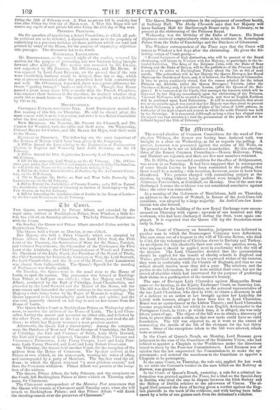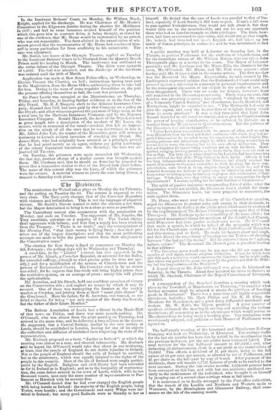ght filttropolis.
The second election of Common Councilmen for the ward of Far- rinedon Without, the former one having been declared void, was brought to a close on Wednesday, as far as regards the polling. A. protest, however, was presented against the return of Mr. Wells, on the ground that he is not an inhabitant householder. By this election, three of the former Common Councilmen—Messrs. Galloway, Price, and Marriott are rejected, and there are five new members returned.
Mr. D. Gibbs, the successful candidate for the office of Bridgemaster, was sworn in on Saturday. It had been supposed that in consequence of some frauds known to have been committed in the polling, that there would be a scrutiny : this intention, however, seems to have been abandoned. Two persons charged with committing perjury at the election, by voting without being qualified, were brought before Mr. Alderman Farebrother, at Guildhall, on Monday. One of the men was discharged because the evidence was not considered conclusive against him ; the other was remanded.
At a meeting of the Reformers of Marylebone, held on Thursday, an address to the electors of Walsall, in favour of the Anti-Corn-law candidate, was adopted by a large majority. An Anti-Corn-law Asso- ciation was also formed.
The works for the building of the new Royal Exchange were recom- menced on Thursday with vigour ; upwards of one hundred and fifty workmen, who. had been discharged during the frost, were again em- ployed. It is expected that the Queen will lay the foundation-stone early in June.
In the Court of Chancery on Saturday, judgment was delivered in another case in which the Ironmongers Company were defendants.
The case arose out of a bequest in the will of Thomas Betton, who died in 1723, for the redemption of Christian slaves in Barbary and Turkey. As no objects for this charitable fund now exist, the question arose, to what purpose it should be applied most in conformity with the will of
the testator. The Lord Chancellor decided that the accumulation should be applied for the benefit of charity schools in England and Wales ; provided that, according to the expressed wishes of the testator, they were in conformity with the Church of England, and that no one school should receive more than 201. a year. The relatiors, and the
parties to the information, he said were entitled their costs, but not the crowd of charities which had intervened for the purpose of preferring their claims to a participation of the testator's bounty.
The case of Dowager Lady Clarendon against Marguerita Bratti came on for hearing, in the Equity Exchequer Court, on Saturday last.
The bill was filed by Lady Clarendon, as the personal representative of the late Lord Clarendon, who died in 1838, to obtain a discovery in aid
of a defence to an action at law brought against her Ladyship for 3,5001. with interest, alleged to have been lent to Lord Clarendon. Bruni was an opera-dancer at the Lisbon Theatre ; and Lord Clarendon became acquainted with her whilst he was English Ambassador to the Portuguese Court, in 1810 ; at which time, it is alleged, she was only fifteen years of age. The object of the bill was to obtain a discovery of facts, to prove that such a claim as that now made could have no valid foundation. The bill was objected to, as it went to the extent of demanding the details of the life of the claimant for the last thirty years. Some of the exceptions taken to the bill were allowed, others were overruled.
In the Court of Queen's Bench, on Monday, Lord Denman gave judgment in the case of the Guardians of the Braintree Union, who had refused to appoint a Chaplain to the Workhouse under the directions issued to them by the Poor-law Commissioners. Lord Denman was of opinion that the law empowered the Commissioners to make the ap- pointment; and ordered the mandamus to the Guardians to appoint a Chaplain to be peremptory. In the same Court, on Thursday, the rule nisi, applied for last week to set aside the Coroner's verdict on the men killed on the Railway at Harrow, was granted.
In the Court of Queen's Bench, yesterday, a rule for a criminal in- formation was granted against the Times, for a libel on the Special Jury in Dublin, who tried the case in dispute between the Irish Society and the Bishop of Dublin relative to the advowson of Camns. The al- leged libel accused the Jury of having given a verdict against the Eng- lish plaintiffs in the teeth of the evidence, and with having been infla- enced by a bribe of one guinea each from the defendant's solicitor.
In the Insolvent Debtors Court, on Monday, Sir William Boyd, Knight, applied for his discharge. He was Chairman of Mr. Hume's Committee in the Edgeware district during the election for Middlesex in 1837 ; and had in some instances availed himself of the position which this gave him to contract debts, it being thought, as stated by one of the creditors, that Mr. Hume would be represented by no person who was not respectable. The facts elicited in the examination of wit- nesses proved that the representative of Mr. Hume had conducted him- self in many particulars far from creditably to his constituent. The case was adjourned. Mr. Butler, late lessee of the Olympic Theatre, applied on Tuesday to the Insolvent Debtors' Court to be liberated from the Queen's Bench Prison until his hearing in March. The insolvency was attributed to the entire failure of the Olympic Theatre. The debts were upwards of 1,2001. The bail was accepted, and the discharge of the insolvent was ordered until the 26th of March.
Application was made at Bow Street Police-office, on Wednesday, to liberate Vincent the Chartist, on bail ; instructions having been sent to the Magistrates, from the Home Office, authorizing them to take bail for him. Owing to the want of some requisite formalities on the part the persons offering themselves as bail, the case was postponed.
Sir Peter Laurie was occupied at the Mansionhouse, on Thursday, Friday, and Saturday, in hearing further evidence as to the loss of the ship Dryad. Mr. R. J. Shepard, clerk to the Alliance Insurance Com- pany, deposed that 7151. had been paid by that Company on a policy on the Dryad; and other witnesses proved the payment of large sums, as for a total loss, by the Maritime Insurance Company, and by the Neptune Insurance Company. Ronald Maxwell, the mate of the Dryad, entered at great length into a description of the conduct of Mr. Loose, the master, while in command of the vessel—conduct that left an impres- sion on the minds of all the crew that he was determined to lose it. Mr. Alfred John Tait, the master of the Bencoolen, gave still stronger testimony to Loose's evident intention of wrecking the Dryad. Mr. James Stott, who had originally been arrested as a principal, proved that he had acted merely as an agent, without any guilty knowledge of the others' fraudulent intentions. Oa Saturday, the case was ad- journed till Tuesday.
On Tuesday, the prisoners were again remanded till Wednesday. -On that day, another charge of a similar nature was brought against them. Mr. Clarkson said, that he should on Saturday be prepared to prove that a transaction similar to that of the Dryad took place before. The name of this second ship was the Lucy, of which the prisoners were the owners. A material witness to prove the case being absent, a remand to Saturday took place.



























 Previous page
Previous page